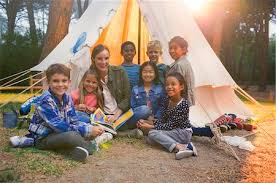Some Notes on Camp
Listen to the Recess! Clip
| Author | Kenneth Kidd |
| Air Date | 6/27/2001 |

Some Notes on Camp Transcript
Organized camping in the United States dates to 1861, when Frederick William Gunn, headmaster of the Gunnery School in Connecticut, took his entire student body for a two-week foray into the wilderness. The camping movement gathered steam with the development of Scouting, the YMCA, and the Woodcraft Movement. So much so that in 1916, the President of Harvard University remarked that “the organized summer camp is the most significant contribution to education that America has given to the world.” By 1935, camp directors had formed the American Camping Association, and by 1959, there were over 13,000 camps nation-wide.
For nearly fifty years, my family ran a summer camp for boys in the hill country of central Texas. I grew up riding horses, making lamps out of driftwood, and learning about the Tonkawa Indians. We campers lived in cabins named after horses: Shetlands, Colts, Ponies, Paints, Mustangs.
We called the camp Friday Mountain. It was founded in 1852 as the Johnson Institute by a Methodist circuit rider and teacher named Thomas Jefferson Johnson, called “Bristletop” due to his abundant facial hair. Nearly a century later, my family transformed the former school into a summer camp. Once again, boys swam in Windy Cove, slept under the stars, and stumbled across all four of the state’s poisonous snakes.
Although modeled on the camping programs of boy work agencies, Friday Mountain also resembled the more posh camps designed for upper middle-class children. Our facilities were both rustic and advanced, a weird mix of faulty plumbing and tennis courts, starvation hikes and scuba lessons. One of the promotional brochures assured parents that our camp was “virtually insect free.”
To my sadness, the camp closed in 1984. In another odd twist of fate, Friday Mountain is now home to the Barsana Dham, one of the largest ashrams in the U.S., and the headquarters of the International Society of Divine Love. At first I was afraid to visit. But I like what they’ve done with the place. It’s still a haven from the urban world. You can tour the grounds and stay for a vegetarian meal. It’s hard to let go of the places of childhood, but I’ve learned you can keep them close to your heart while moving on.